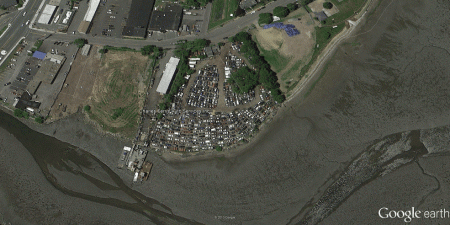
Water Pollution Cited by Environmental Groups in Suits against Salvage Yard and Forging Plant
BOSTON/South Boston - Environmental groups have launched separate lawsuits alleging water pollution violations under the federal Clean Water Act.
The Conservation Law Foundation has launched a case against Charles Ferris Auto Service in Salem, Mass. for what they allege is “continuous and ongoing unauthorized discharges of polluted stormwater runoff” by the company into the North River, which continues into the Danvers River, and Beverly Harbor.
Filed at the US District Court in Boston on July 18, the complaint alleges that during the dismantling and processing of cars at the Ferris salvage yard, “precipitation comes into contact with pollutants generated by these activities, it picks up the pollutants and is conveyed to [the] North River and into thence Danvers River, Beverly Harbor, and the Atlantic Ocean.”
According to the complaint, “Stormwater runoff is one of the major sources of contamination of [the] North River, Danvers River, Beverly Harbor and their tributaries. Stormwater is water from precipitation events that flows across the ground and pavement after it rains or after snow and ice melt.”
The complaint alleges that, “pollutants present in stormwater discharged from the Facility include, but are not limited to: oil and grease; ethylene glycol; toxic and heavy metals; mercury; sulfuric acid; galvanized metals; aluminum; petroleum hydrocarbons; suspended solids; arsenic; organics; chlorinated solvents; acid/alkaline wastes; phosphorous; salts; antifreeze, transmission and brake fluids; nutrients; pathogens; trash; hydraulic fluids; acids and solvents; sediment and total suspended solids; pH-affecting substances; fugitive and other dust, dirt, and debris, and elevated temperature.”
It outlines that the “Charles watershed is home to aquatic life, plants, and animal species that rely on the North River, its tributaries, and adjacent wetlands for their survival,” but that the North River, Danvers River and Beverly Harbor do not meet the EPA’s “minimum water quality standards for pathogens.”
The plaintiff, with its main office in Boston, describes its “mission” as including “the conservation and protection of the many uses of the waters in and around the Charles watershed,” and to do this it, “actively seeks federal and state agency implementation of the Clean Water Act and, where necessary, directly initiates enforcement actions on behalf of itself and its members.”
The plaintiff has brought the suit for Ferris’ alleged failure to obtain and comply with a permit for industrial discharges into water, unauthorized discharges, and other violations of EPA rules and the Clean Water Act.
In a similar, but separate case brought under the federal Clean Water Act, non-profit group Clean Water Action has filed a lawsuit against Doncasters Inc. in Springfield, Mass.
Filed at the US District Court in Boston on June 26, the complaint alleges that the industrial plant allows storm-water runoff to enter and pollute Poor Brook, a tributary of the Chicopee River in violation of environmental regulations.
CWA says the organization, “actively seeks Federal and state agency implementation of the [Clean Water Act] and other laws and, where necessary, directly initiates enforcement actions on behalf of itself and its members.”
The complaint alleges that because, “Some activities at the Facility take place outside and are exposed to rainfall,” it can lead to pollutants entering the water at Poor Brook, such Total Suspended Solids (TSS), heavy metals, and Nitrate with Nitrite Nitrogen.
Explaining the effects of the pollutants, it says, “Suspended solids in high concentrations block sunlight from reaching vegetation submerged in water bodies, and can cause many problems for water quality and aquatic life, including decreased dissolved oxygen, habitat alteration, and increased pathogens. These problems are exacerbated by the presence of oil and grease, which can float on the water’s surface and block sunlight needed by underwater fish and plants. The combination of oil and grease and particulates can also damage stream habitat and sensitive spawning areas when they cling to sand and gravel particles that settle to the bottom of streambeds.
“Metals: Aluminum, iron, zinc, and other metals can be toxic to fish, aquatic plants, and other aquatic life. They are also hazardous to human life if they enter the water supply. Metals in the form of solid particulate can settle on the bottom of water bodies and destroy bottom-dwelling invertebrates, plants, or incubating fish eggs.
“Nitrate plus Nitrite Nitrogen: Nitrogen-containing compounds act as nutrients in streams and rivers. Nitrate reactions in fresh water can cause oxygen depletion, and thereby kill aquatic organisms. Nitrites can produce a serious condition in fish called "brown blood disease." Nitrites also react directly with hemoglobin in human blood and other warm-blooded animals to produce methemoglobin, which is especially dangerous for babies under three months of age.” (Quotation in complaint)
Both suits seek judgments on the alleged violations and for the defendants to restore the quality of all water bodies affected, to stop discharging pollutants except by permit, and pay substantial penalties and costs to the plaintiffs.
In answer, Charles Ferris Auto denies the significant allegations made by CLF, and Doncasters has yet to respond to the CWA complaint.
The CLF case will be heard by Judge Nathaniel Gorton and the CWA case will be heard by Chief Judge Patti Saris.
This article was produced for Open Media Boston's Open Court Project.

